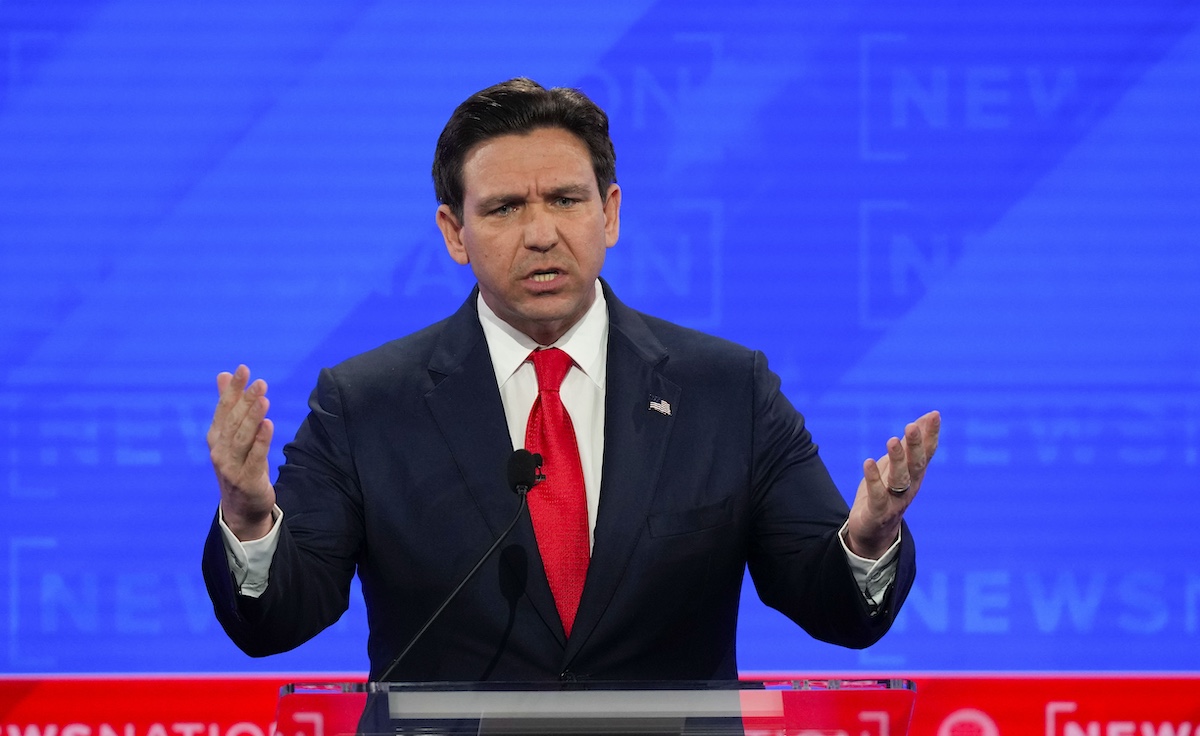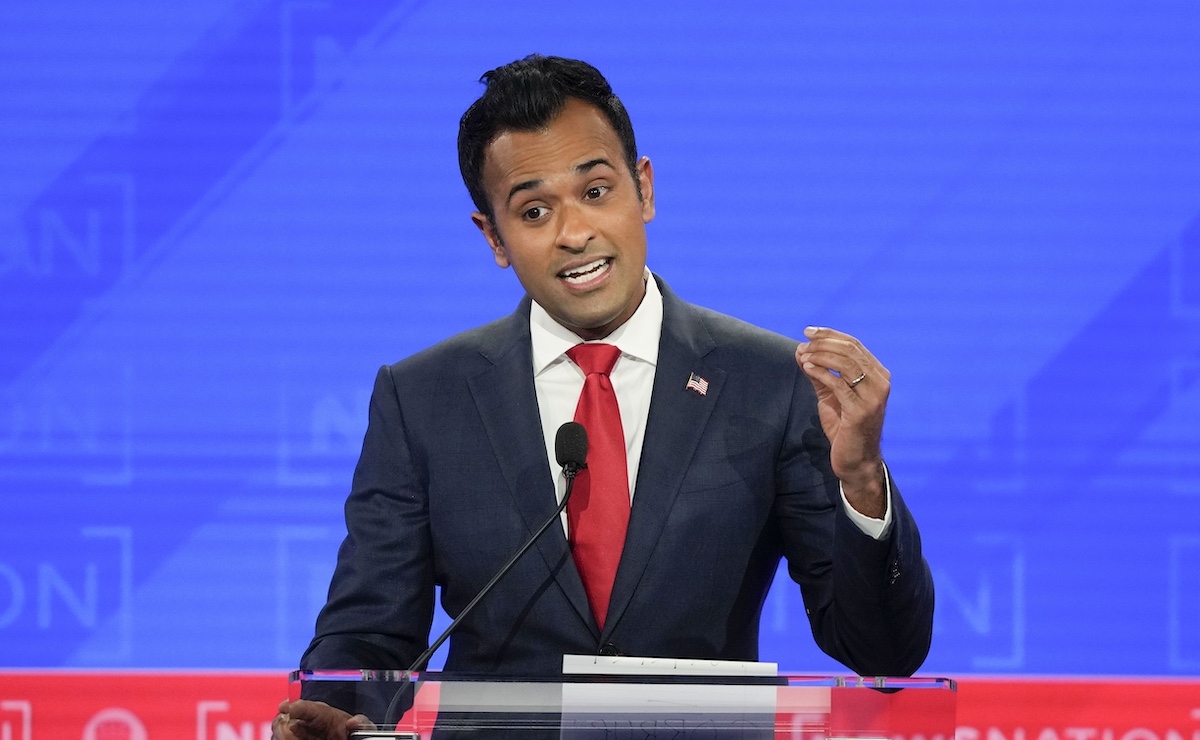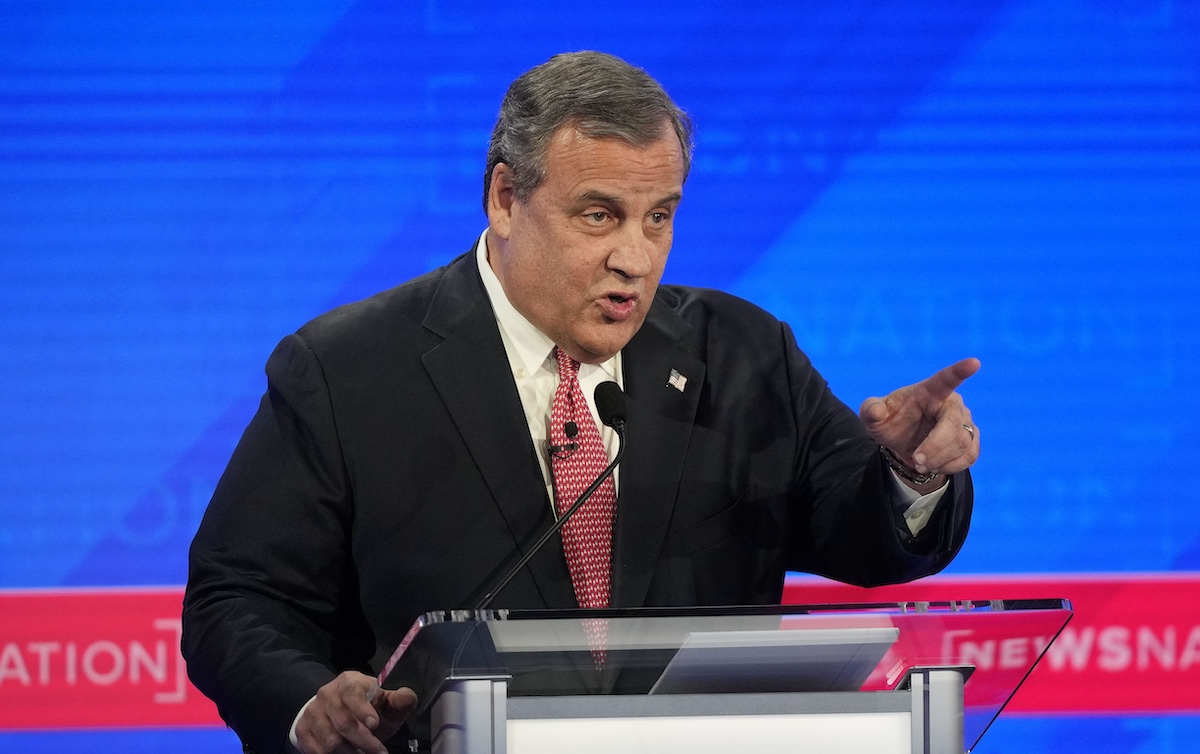Get PolitiFact in your inbox.

Republican presidential candidates from left, Chris Christie, Nikki Haley, Ron DeSantis and Vivek Ramaswamy participate in Republican presidential primary debate Dec. 6, 2023, at the University of Alabama in Tuscaloosa, Ala. (AP)
Fingers pointed and tempers flared as Republican candidates for the 2024 presidential nomination faced off during the fourth primary debate.
The debate, held in solidly Republican Tuscaloosa, Alabama, was the last GOP presidential debate of 2023 and came just 40 days before Jan. 15, when the first official votes will be cast in the Iowa caucuses.
In this debate, the Republican field was whittled down to four qualifying candidates: Former New Jersey Gov. Chris Christie, Florida Gov. Ron DeSantis, former South Carolina Gov. Nikki Haley and entrepreneur Vivek Ramaswamy.
The candidates squabbled over electability, corruption and support for Israel. They also discussed former President Donald Trump’s recent comments on immigration, inflation and how he’d handle a second presidency. Trump, the GOP front-runner, skipped this debate, as he had the previous three.
Here, we fact-check the candidates’ claims.
DeSantis: "I did a bill in Florida to stop the gender mutilation of minors. It’s child abuse and it's wrong. (Haley) opposes that bill. She thinks it's fine and the law shouldn't get involved with it."
This claim has two parts, and each needs more context.
In May 2023, the Florida Legislature passed a bill that banned gender-affirming surgeries for minors. Experts told PolitiFact that gender-affirming surgeries are not the same as genital mutilation. And the law didn’t ban just surgeries — it banned all gender-affirming medical care, including puberty blockers and cross-sex hormones, which are supported by most major U.S. medical organizations.
Surgeries are rarely provided as part of gender-affirming care for minors.
In a June CBS interview, Haley said when it comes to determining what care should be available for transgender youth, the "law should stay out of it and I think parents should handle it." She followed up by saying, "When that child becomes 18 if they want to make more of a permanent change they can do that."
Haley’s campaign pointed to a May ABC television appearance in which she said that a minor shouldn’t have a "gender-changing procedure" and opposed "taxpayer dollars" funding one.
Haley: "I said that if you have to be 18 to get a tattoo, you should have to be 18 to have anything done to change your gender."
During the debate, Haley likened her position on gender-affirming care for minors — that it should be up to parents until the child is 18 — to age requirements for getting a tattoo: "I said that if you have to be 18 to get a tattoo, you should have to be 18 to have anything done to change your gender."
We’ve heard that comparison before. Two-thirds of U.S. states allow minors to get tattoos if their parents consent. And medical experts have told us gender-affirming care is in many cases considered medically necessary, while tattoos are cosmetic.
DeSantis: "South Carolina had a bill to try to say that men shouldn’t go into girls’ bathrooms, and (Haley) killed that bill."
DeSantis has a point that the bill died and Haley had criticized it.
As governor, Haley said in 2016 that she didn’t believe it was "necessary" to pass a Senate bill that would have required people to use the bathroom that aligned with their sex. A similar law in North Carolina, H.B. 2, had sparked backlash and boycotts.
The South Carolina bill, which would have applied to public and school restrooms, stalled in committee, so it never reached Haley’s desk. In a 2022 appearance on Fox News, Haley said that she "strong-armed" the bill and that schools should resolve the issue with parents.
Moderator Megyn Kelly, to Christie: "When you were governor in 2017, you signed a law that required new guidelines for schools dealing with transgender students. Those guidelines required schools to accept a child's preferred gender identity, even if the minor’s parents objected. And it said that there is no duty for schools to notify parents if their son or daughter changes their gender identity, allowing this serious issue to remain a secret between the school and a child.
Christie: "That's simply not true. That law was put into effect in 2018 and regulated in 2018 after I was out of office."
This needs clarification.
In July 2017, Christie signed into law a bill passed by the Democratic-led New Jersey Legislature that required the state’s Department of Education to issue guidance to public schools for policies regarding transgender students.
The Legislature asked for guidelines on several topics, including the use of restrooms and locker rooms, and whether students should be required to use facilities that conflicted with their gender identities. It also required guidance on privacy, "including ensuring that school personnel do not disclose information that may reveal a student's transgender status." It did not specifically mention parental notification.
The department’s guidelines came in 2018, during Democratic Gov. Phil Murphy’s administration, when Christie was no longer governor.
That guidance said a school district should accept a student’s stated gender identity and that "parental consent is not required."
"There is no affirmative duty for any school district personnel to notify a student’s parent or guardian of the student’s gender identity or expression," it said.
Ramaswamy: "Transgenderism is a mental health disorder."
PolitiFact rated Ramaswamy’s claim False after he introduced it at the second primary debate.
In the past, medical professionals viewed the experience of being transgender as a "disorder," but they no longer agree on that categorization. In the last decade, diagnostic manuals published by the World Health Organization and American Psychiatric Association contained updated language to clarify that being transgender is not a mental illness. Experts told us that persistent gender dysphoria can cause other mental health problems, but it is not itself a mental health disorder.
Haley: "Fifty percent of adults 18 to 25 think that Hamas was warranted in what they did with Israel" in the Oct. 7 attacks.
Haley’s claim appears to stem from a Harvard-Harris poll of 2,116 respondents conducted after the Hamas attacks. It asked, "Do you think the Hamas killing of 1,200 Israeli civilians can be justified by the grievances of Palestinians or is it not justified?" Fifty-one percent of respondents 18 to 24 (not 25 as Haley said) said the attacks were justified; 49% said the attacks were not justified.
But this statistic carries several caveats.
First, the sample size for this age group was small, about 199 people. That means the 51% to 49% result could be much wider because of sampling error.
Second, not one of three other polls conducted around the same time, revealed support for Hamas among young people to be that high.
Finally, 18-to-24-year-olds in the Harvard-Harris poll gave wildly inconsistent answers to other questions. By 2-1 margins, those respondents said Hamas’ Oct. 7 action "was a terrorist attack"; that the attacks "were genocidal in nature"; that Israel has "a responsibility" to retaliate "against Hamas terrorists"; and that Hamas "is a terror group that rules Gaza with force and fear and is not supported by them."
Dritan Nesho, founder and chief executive officer of HarrisX, the polling company, told PolitiFact these seemingly contradictory views might stem from younger Americans’ relatively unformed views on the conflict and its political complexities.
This extra information is why we rated a similar claim from Ramaswamy about young Americans’ purported support for Hamas Mostly False.
Haley: "The idea that (three university presidents) would go and allow that kind of pro-Hamas protest or agree with the genocide of Jews and try and say that they needed context on that? There is no context to that."
Haley was referring to a Dec. 5 congressional hearing in which Rep. Elise Stefanik, R-N.Y., pressed the presidents of Harvard University, the Massachusetts Institute of Technology and the University of Pennsylvania on whether they would discipline students who called for the genocide of Jews.
In back-and-forth exchanges, the three university presidents responded similarly — disciplinary action for statements about genocide would depend on the context. The presidents did not say they agreed with the genocide of Jews.
When Stefanik asked whether calling for the genocide of Jews constituted bullying or harassment, University of Pennsylvania President Liz Magill said, "It is a context-dependent decision."
Responding to the same question, Harvard President Claudine Gay said, "The rules around bullying and harassment are quite specific and if the context in which that language is used amounts to bullying and harassment, then we take action against it."
Again to the same question, MIT president Sally Kornbluth said, "I have not heard calling for the genocide of Jews on our campus."
Stefanik responded, "But you’ve heard chants for intifada." (Intifada is an Arabic word that means uprising. Some people see this word as a call for violence against Jewish people.)
Kornbluth said, "I’ve heard chants which can be antisemitic depending on the context when calling for the elimination of the Jewish people."
The White House, elected officials and academics criticized the university presidents for their responses.
Haley: "All of the 7 or 8 million illegals that have come under Biden’s watch absolutely have to go back."
This misinterprets available data.
From February 2021, Biden’s first month in office, to October 2023, immigration authorities encountered migrants almost 8 million times at and between ports of entry. But that doesn’t mean 8 million people have entered the country.
Customs and Border Protection’s data tracks events, not people. If one person tries crossing the border three times, for example, that would register as three encounters.
Immigration data also doesn’t tell us how many people have entered and stayed in the U.S. under Biden. Customs and Border Protection data shows that millions of encounters led to removals.
DeSantis: "Nikki Haley said the other day there should be no limits on legal immigration and that corporate CEOs should set the policy on that."
This is misleading.
Haley has not called for unlimited immigration. At a rally and in an interview with the conservative outlet Breitbart, she said legal immigration should be "based on merit" and not on an "arbitrary number."
Every year, the U.S. allows a specific number of immigrants to enter the country for permanent employment. But Haley said that debating what is the best number is "the wrong way to look at" legal immigration.
"Yes, the fabric of America is legal immigration," Haley said at a November rally in New Hampshire. "But let’s get the right ones in that are going to make America better."
Haley said the U.S. should ask the agriculture, tourism and technology sectors what they need.
The focus should be on "those who will lift our economy," Haley told Breitbart in August.
Ramaswamy used his opening statement to claim that Haley was "bankrupt" when she left her post as United Nations ambassador in 2018, but quickly became a millionaire.
"After you left the U.N. you became a military contractor. You actually started joining service on the board of Boeing, whose back you scratched for a very long time, and then gave foreign multinational speeches like Hillary Clinton is, and now you're a multimillionaire," Ramaswamy said. "That math does not add up. It adds up to the fact that you are corrupt."
Haley responded, "My husband is in the military and I served our country as U.N. ambassador and governor. It may be bankrupt to him, but it certainly wasn't bankrupt to us."
Was she really bankrupt? According to Haley’s 2018 financial disclosure, she carried different kinds of debt, including: $25,000 to $65,000 in credit card debt; a $250,000 to $500,000 line of credit; and a mortgage of $250,000 to $500,000.
The form also showed a $1 million mortgage on an investment property she took on from her parents in 2017, but sold in 2018 for $1.2 million. Haley’s office told the Post and Courier, a Charleston, South Carolina, newspaper, that her finances were not why she resigned from the U.N. and that her overall debt was less than $500,000.
Haley’s net worth has quickly risen since then, and is now estimated to be around $8 million, according to Forbes. Her income increased by giving high-paying speeches, writing books and joining corporate boards, including for aircraft manufacturer Boeing Co. and homebuilder United Homes Group, her financial disclosures show.
Ramaswamy has the second-highest estimated net worth of the Republican presidential candidates, Forbes reported, at $880 million. (Former President Donald Trump’s is at $2.6 billion.) Ramaswamy started his career investing in biotech stocks before founding a drug development company in 2014 that’s now worth close to $7 billion.
DeSantis and Haley repeated familiar attacks on China. DeSantis quipped that Haley wrote a "love letter" to recruit Chinese business to South Carolina when she was governor. Fox News reported that Haley wrote to Chinese Ambassador Cui Tiankai in 2014 during her governorship, writing, "We consider your country a friend and are grateful for your contributions on the economic front." She recruited multiple Chinese companies to the state, including a fiberglass company with connections to the Chinese Communist Party.
Haley countered that DeSantis accepted campaign support from a "Chinese" refrigerant company. McClatchy reported DeSantis held a 2022 rally at iGas USA, a Tampa-based refrigerant company, which has "backing from China." CEO Xianbin (Ben) Meng wrote DeSantis a check in August for more than $11,000, McClatchy reported.
As Haley continued, DeSantis said fact-checkers have not found "one instance of me recruiting a Chinese business" to Florida. That’s consistent with what PolitiFact reported in November.
Ramaswamy: "These people want to send your sons and daughters to go die in Ukraine. They’ve been arguing for it for a year."
The other candidates have not said this.
In the second Republican debate, on Sept. 27, DeSantis said, "It's in our interest to end this war. And that's what I will do as president. We are not going to have a blank check. We will not have U.S. troops."
Haley said at an August campaign stop, "I don’t think we need to put troops on the ground. But what we do need to do is get with our allies and make sure they have the equipment and ammunition they need to win."
Although Christie has strongly supported Ukraine in its fight against Russia, we couldn’t find an instance in speeches and other public statements in which he backed sending U.S. troops to fight there.
DeSantis: President Joe Biden wants "a central bank digital currency."
This is misleading. Biden has not proposed a central bank digital currency. In March 2022, he issued an executive order directing a feasibility study for one, however. As a result, the Federal Reserve is studying a central bank digital currency’s pros and cons, as are dozens of countries.
The Federal Reserve said a central bank digital currency would not replace cash. It also said it has not decided to institute such a system and that congressional approval would be required to create one.
DeSantis also said during the debate that a central bank digital currency would take away Americans’ privacy and regulate their purchases.
Bryan Griffin, then DeSantis’ press secretary, told PolitiFact in April the fact that the Fed is studying it "leaves plenty of room for concern." But experts we spoke with in March said current U.S. laws wouldn’t permit the kind of control and surveillance DeSantis described.
Haley: DeSantis "tried to push a law that would stop anonymous people from talking to the press and went so far to say bloggers should have to register with the state if they’re gonna talk about, write about elected officials."
Haley got some things right and some things wrong.
DeSantis did push a Florida bill that would have suppressed journalists’ use of anonymous sources and make it easier to sue news organizations for defamation.
The measure, filed in February, died in committee. It would have removed many protections journalists have against defamation claims, including being able to refuse to identify anonymous sources in most cases. It also would have declared that anonymously sourced statements are "presumptively false for purposes of a defamation action."
But DeSantis didn’t support a failed bill that would have required bloggers to register with the state. The legislation, filed in February by state Sen. Jason Brodeur, R-Lake Mary, required journalists to submit reports if they are paid to write about elected officials, or face fines.
DeSantis said in a press conference shortly after the bill’s filing that he’s never supported the measure. It also died in committee.
DeSantis: "100% of the things I promised as governor, I delivered on those promises."
This is inaccurate. DeSantis has followed through on some of his campaign promises, but not all, PolitiFact’s DeSant-O-Meter promise tracker shows.
Of the 15 promises PolitiFact tracked, DeSantis kept five and compromised on six. We’ve rated one Stalled and one In the Works. His remaining two pledges were rated Promise Broken.
DeSantis failed to follow through on his 2018 promise to lower the corporate tax rate in Florida. The rate dropped temporarily from 2019 to 2021 before rebounding in 2022 to 5.5% — the rate it was before he took office.
We also rated Promise Broken his pledge to reduce the state’s communication services tax. The tax is levied on services such as cable and satellite television, video and music streaming and telephone and mobile communications. Florida’s total communications services tax rate of 7.44% has consistently ranked as one of the nation's highest. It hasn’t budged during DeSantis’ governorship.
Ramaswamy: "The 2020 election was indeed stolen by Big Tech."
This is wrong. Allegations of a rigged or stolen 2020 election have been rebutted by audits, judges, and officials in Trump’s administration.
We contacted Ramaswamy’s campaign during the debate to ask for his evidence and received no immediate response. On NBC’s "Meet the Press" on Aug. 27, Ramaswamy said, "There's hard data showing that many voters, many independent voters, would have changed their result enough to influence the outcome of the election if they had been exposed to what we now know to be the truth about the Hunter Biden laptop story."
The laptop was left at a Delaware computer repair shop, and some of the laptop’s contents were reported by the New York Post in October 2020, weeks before the presidential election. The laptop story was suspected to be Russian-planted disinformation, but subsequent reporting contradicts that premise.
Twitter blocked users from sharing the story. Executives at the tech giant now say that was done errantly. Since the 2020 election, news organizations such as CBS News, The New York Times and The Washington Post have independently verified at least some of the laptop’s contents.
But there isn’t evidence that Twitter’s actions resulted in the election being stolen.
A 2022 poll by a self-identified "right-leaning outfit" found that among a group of people who had been following the story, 28% would have been "very likely" to change their vote had they known the laptop was not disinformation, and 25% were "somewhat likely."
However, the pool of respondents who answered this question leaned Republican more strongly than the general population, so most of these voters would not have been voting for Biden in the first place.
Ramaswamy: "Jan. 6 now does look like it was an inside job."
This is Pants on Fire.
Numerous investigations into what happened Jan. 6, 2021, including by a congressional committee, have found the U.S. Capitol attack was orchestrated and executed by people who supported Donald Trump’s presidency and believed or pushed false claims that the 2020 election was "stolen." Extensive court records involving more than 1,200 defendants also back this up.
The public record for hundreds of defendants shows that many considered their actions patriotic; they believed they were on the front lines of a revolution or civil war. Rioters scaled walls, broke windows, forced their way into the building and clashed with police.
Among people sentenced for seditious conspiracy are multiple members of far-right groups including the Proud Boys extremist group and militia groups including the Oath Keepers.
DeSantis: When Calvin Coolidge was president, "the country was in great shape."
Historians disagree about the success of Coolidge’s presidency, which ran from 1923 to 1929.
Coolidge’s reputation has risen in the past two decades, especially among conservatives, who value his record of balanced budgets, low taxes, light regulation and limited government. Biographer Amity Shlaes, who chairs the Calvin Coolidge Presidential Foundation, wrote that, under Coolidge, Americans began buying cars and electric appliances, and patents "increased dramatically."
Coolidge’s hands-off approach appeared to be reasonably popular with Americans. But the Roaring ’20s ended abruptly with the Great Depression five months after Coolidge left office. This sequence of events has been hard for historians to ignore: A periodic survey of historians currently places Coolidge 24th in the ranking of presidents, just below average.
"Much was happening both at home and abroad, and one must ask whether Coolidge’s policy of apparent inertia was really appropriate for a twentieth-century presidency," wrote Peter Clements, author of "Prosperity, Depression and the New Deal." Coolidge "spoke in his inaugural address of problems such as lynching, child labor and low wages for women. Yet he did nothing to overcome any of these issues."
David Greenberg, another Coolidge biographer and a Rutgers University historian, has faulted Coolidge failing to help farmers in the run-up to the Depression and for a foreign policy approach that failed to forestall fascism’s rise in Europe.
Citing an "arrangement with the Republican National Committee," debate moderator Megyn Kelly introduced Fitton, president of the conservative group Judicial Watch, to briefly question the candidates. As he spoke about Trump’s legal cases, Fitton contrasted approval ratings for the FBI, Justice Department and the U.S. Postal Service: "A recent Gallup poll shows that Americans think more highly of the U.S. Postal Service than they do the FBI or Justice Department."
This is accurate, although people have viewed the Postal Service favorably for years, according to Gallup polling.
In September 2023, Gallup asked 1,016 adults living in all 50 states and Washington, D.C., to rate the performance of 16 federal agencies "excellent," "good," "only fair," "poor" or "no opinion."
Four of 16 agencies received positive ratings from a majority of people surveyed. The Postal Service got the highest percentage of positive feedback; 62% of respondents rated its job performance "excellent" or "good."
By comparison, 46% of Gallup poll respondents rated the FBI "excellent" or "good." Thirty-three percent of respondents rated the Justice Department "excellent" or "good." Among all 16 agencies, the Justice Department had the highest percentage of "poor" ratings.
Reporting by Grace Abels, Marta Campabadal Graus, Jeff Cercone, Madison Czopek, Louis Jacobson, Samantha Putterman, Maria Ramirez Uribe, Amy Sherman, Sara Swann and Loreben Tuquero.
Our Sources
Please see links in article.













































